
As some of you may recall, I put out a call last autumn — seems so long ago, doesn’t it? — to Author! Author! readers, asking for fearless volunteers willing to subject their query drafts to our collective scrutiny toward the end of Queryfest. Yes, I had been including many, many — some might say too many — concrete examples of what does and does not work in a query, generally speaking. Since the vast majority of queriers new to the process tend to make the same fifteen or twenty missteps, that made sense. Still, I wondered: were there other up-and-coming query problems floating around out there that I had not yet addressed?
We’re now within a couple of posts of wrapping up this series, and I must say, I think the results have bordered upon magnificent. Largely, that’s thanks to the bravery and generosity of readers having volunteered their queries for discussion, offering a truth to which our old pal, Millicent the agency screener, can easily attest: querying is not only a learned skill, but often a counter-intuitive one.
Perhaps the most counter-intuitive element of all: no matter how strong a query’s book description is, if it’s not presented in the manner Millicent has been trained to expect, it’s likely to trigger rejection.
Even now, I sense a few jaws hitting the floor out there, do I not? We would all like to believe that a great book’s chances could not be stymied by a less-than-great query — which would mean, by extension, that contrary to the publishing truism, good writing does not always find a home — but as this series has repeatedly demonstrated, it’s actually not all that hard to turn off Millicent.
And not just via the classic red flags, either. The recent run of readers’ queries only confirmed what we had already discussed in theory: time and again, we have seen how quite interesting-sounding books can be undersold by queries that could use some punching up.
So punch them up we have. On the assumption that it is a far, far better thing for me to call out a query for a problem here, in this writer-friendly forum, than for even a single precious one of you to risk tumbling into the same trap at the agency of your dreams, I’ve been running readers’ queries through the wringer, going after them with a fine-toothed comb, blue-penciling them, and engaging in every other stock euphemism for taking ‘em apart so we could rebuild them better, faster, stronger.
That’s why I was especially delighted to see a query from reader P. Gaseaux (not his real name, of course) drop into the entry box. Not merely because his story sounds, somewhat unusually for thriller descriptions in queries, actually thrilling, but also because it is a query addressed to a US-based agent. In this case, my fictional Hawkeye McAgentson, Millicent’s hard-nosed employer.
Why did spotting a query from foreign climes excite me so? Well, we American writing advice-givers don’t talk all that much, as a group, about the special problems confronting the writer querying from abroad. The difficulty in obtaining US postage for the SASE, for instance: while foreign post offices and copy centers do occasionally stock US postage for this purpose, they often sell them at a substantial mark-up. Rather than limiting themselves only to e-mailed queries, however, frugal far-flung writers can purchase US stamps at their face value directly from the US Postal Service.
Then, too, there’s the terminology difficulty: while US English, Canadian English, and UK English are mutually comprehensible, they do not have identical vocabulary or grammar. That can lead to problems at international submission time; what would be perfectly acceptable in London might well strike an American Millicent as improper, and rightly so.
Before anyone starts fuming, let me hasten to add: it’s an agency’s job to flag problems in clients’ manuscripts before even considering submitting them to editors at publishing houses. American books are typically written in American English. So would it really be in a London-based writer’s best interest if Millicent or her boss did not alert him to what would not read right to New York eyes?
Speaking of what would not look right to New Yorkers, I hope that my international readers (at least those planning to submit to US agencies) are aware that the standard paper size is different here than everywhere else in the world: 8.5″ x 11″ paper is called US letter for a reason. Why should a querier from afar care? Well, although A4 (8.26 x 11.69 inches) and US letter (8.5 x 11 inches) may not seem all that off at first glance, naturally, estimating word count would be quite a different proposition on each. Equally naturally, but often surprising to writers submitting from abroad, no US-based agency could possibly submit a manuscript printed on A4 to a US publisher.
That means, in practice, that if Millicent’s agency accepted submissions, or even query packets, on A4, they would be signing on for the difficulties of reconfiguring the text for US letter. While that’s actually not that big a deal in MS Word — all one really has to do is highlight the entire document, pull down the FILE menu, select PAGE SETUP…, and change the PAPER SIZE from US letter to A4 — it will, alas, take both time and explanation to pull off. And we all know what Millicent has been trained to say to potential clients who might be the teensiest bit more time-consuming to represent than others, right?
That’s right, campers: “Next!”
Don’t let that depress you into a stupor, far-off writers. Plenty of good foreign writers are represented by US agencies; there are a heck of a lot of readers here, after all. Also, in some genres, such as SF and fantasy, there are so many more agent options here than elsewhere that if you write in English, domestic or otherwise, sheer probability dictates that taking a swing at the American market might be very prudent move. For a lot of reasons, then, it can be very worth your while to query from abroad.
But in order to do so successfully, it’s vital to be aware precisely how and why standards here are different. Let’s take a look at what our valiant far-flung friend P. Gaseaux is planning to send to a New York-based Millicent, to see if we can help him punch it up a little.
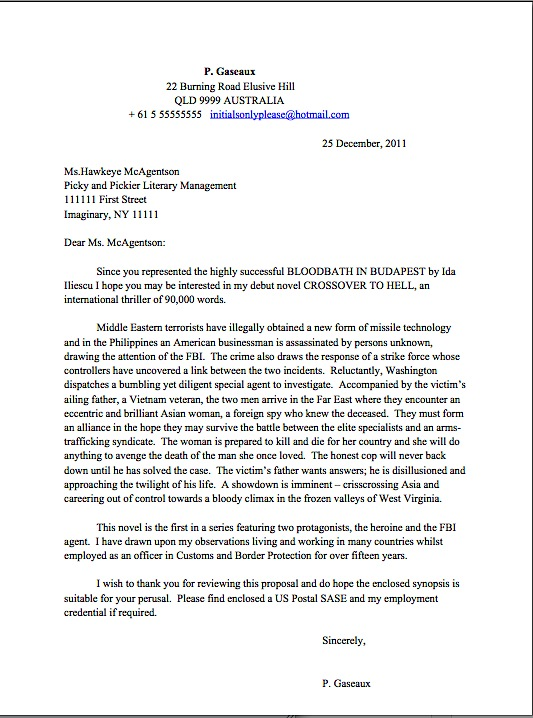
The book description is intriguing, but I’m afraid that’s not what would catch Millicent’s eye first here. Sadly, many of these would not be apparent to eyes not born and bred in the good old U.S.A.
So let’s all pull together, those of us who were weaned on 8.5″ x 11. Any guesses about what eight — yes, you read that correctly — non-content-related factors would distract Millie here? Hint: not all of the formatting issues are related to paper size.
Oh, that wasn’t a broad enough hint for you? Okay, here are a few more.
1. Since many, many writers new to querying have never had the opportunity to see a professionally-written query — an oversight that Queryfest has been working, if not overtime, at least at great length to rectify — a hefty percentage of queriers would not have any idea that the first eye-catcher here is a red flag. In fact, we’ve seen it in earlier Queryfest examples.
2. We’ve also seen the second: like the first, it would be hard to catch at the composition phase, but quite obvious in a printed version. And, like the first, while it might not prevent Millicent from reading on to the body of the letter, it would raise enough doubts about the sender’s Word-wrangling acumen to cause her to assume, rightly or not, that P’s manuscript would not be in standard format.
Yes, really. Had I mentioned that it’s Millie’s job to draw conclusions about manuscripts based solely upon the contents of the query packet?
3. We’ve also talked about this one before. Because it is different in one significant respect than everything else on the page, it’s probably the first thing your eye hit. Considering that it’s not information likely to interest Millicent until after she has read the query in its entirety, that’s a misplaced emphasis.
4. This space-saver would be an instant-rejection offense in a manuscript or book proposal, but a surprisingly high percentage of aspiring writers do not think of it as even a misdemeanor in a query. To Millicent, though, it just looks like cheating. Still worse, it probably caused Problem #2.
5. A deviation from standard format for manuscripts — and a classic Millicent-irritator.
6. Another space-saving tactic, this time at the bottom of the page. Again, most queriers would consider this acceptable, but to anyone who reads queries for a living, it merely looks like an attempt to get more words on the page. The sad thing is, if Problem #1 were not in evidence, #5 probably would not be, either.
7. A savvy stateside aspiring writer would probably have to draw this one as a conclusion from the problems above. It would be apparent to Millicent, however, as soon as she lifted the letter from its envelope and held it in her hand.
Have those clues whipped your brainstorm up to hurricane levels? I certainly hope so. To help that squall along, here’s P’s query again, with those eye-distracters corrected. For those of you who would like another hint, #7 will become substantially more apparent if you compare these two examples.
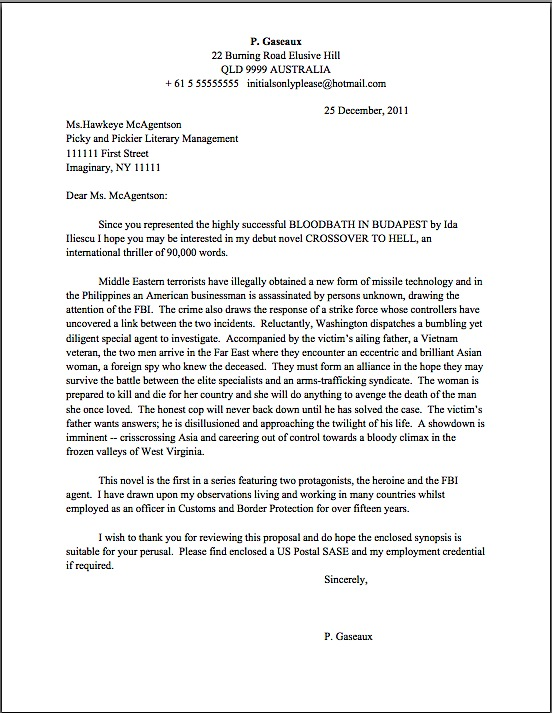
Let’s go through the changes one at a time, shall we? In the original:
1. The writer’s contact information begins on the first line of text, not in the header.
We’ve seen this one before, have we not? If the contact information is going to appear at the top of the page, mimicking pre-printed letterhead, it should be printed exactly where it would be on letterhead: in the header. Not only does placing it in the body of the page limit how much room P. has to describe his book, writing credentials, and so forth — its placement also implies that he’s unfamiliar with how the header function works.
And why might that prove problematic at query time, campers? Because Millicent must base her best guess about the professionalism of the manuscript upon what she has before her, no more, no less. For that reason, she would be within her rights to presume that P’s manuscript would place the slug line — the author’s last name/title/page # designation at the top of each and every manuscript page — on the top line of text, too, rather than the header.
Remember what I was saying above about how agencies feel about time-consuming clients? Consider it reiterated here.
2. The contact information was not centered on the page.
Rather than using Word’s centering function, P. has elected to hand-space his contact information. For some reason best known to himself, he has taken it only about a third of the way across the page, rather than half. It doesn’t look bad there, aesthetically speaking, but to Millicent, it will not look right.
This one may seem minor, but again, each individual presentation element adds up to an overall impression of professional seriousness. And think about it: would you rather have Millicent devote her often quite limited time — as in 30 seconds or so per query — with your missive to speculating about why the spacing is so funny, or to pondering what you have to say?
I thought as much. Let’s move on.
3. The writer’s e-mail address was printed in blue, not black, and was underlined.
Again, we’ve seen this one before in reader-submitted queries, and with good reason: Millicent sees it all the time. Recent versions of Word will, left to its own devices, automatically switch any e-mail address or URL into a link, underlining it and changing the color.
Change it back. Just as passively going along with what Word dictates will not yield standard format in manuscripts, its color and underlining preferences are not proper in a query, either. Chant it with me now, long-time readers: every word in a document sent to the publishing industry should be printed in black ink on white paper. No exceptions. And just as nothing should be underlined in a manuscript, nothing should be underlined in a query, either.
You wouldn’t want Millicent to leap to the conclusion that you don’t know how to format a manuscript, do you?
4. The left and right margins were not 1 inch in depth.
There’s a reason for this (and we shall discuss it below, never fear), but trust me, any experienced professional reader would notice that the right and left margins are not even. At the risk of making her seem eager to assume the worst — which is, after all, her job — Millicent is likely to place a negative construction on this.
Why? Well, since so many aspiring writers chafe against the one-page length restriction, she’s used to queries that tinker with the margins and typeface in order to cram more words onto the page. I don’t think that was P’s intention here, actually, but since neither he nor I are going to be there when Millie reads this letter, let’s not give her the excuse to malign his motives.
5. The dash in the last sentence of the second paragraph was single, rather than doubled.
To Millicent’s swift eye, as well as any well-trained professional reader’s, the dash should be doubled in this sentence: A showdown is imminent – crisscrossing Asia and careering out of control towards a bloody climax in the frozen valleys of West Virginia.
Oh, you didn’t catch that the first time around? Most queriers wouldn’t, for the exceedingly simple reason that most aspiring writers don’t know that in a book manuscript, dashes are always doubled, with a space at either end, rather than single. (Not to be confused with a hyphen, which separates compound words. That should be single, with no spaces between the punctuation and the word on either side. If the distinction remains unclear to anyone, drop a note in the comments, and I’ll show you some examples.)
6. The bottom margin was much under the requisite 1 inch.
Again, this is going to strike most Millicents as an attempt to force her to read more words than the 1-page limit allows. While that is indeed the case here, this tactic is completely unnecessary: as we may see in the revised version, simply moving the contact information to the header will free up more than enough space on the page to permit a standard-sized bottom margin.
7. The query was printed on A4 paper.
We discussed this one above, right? Simply switching the paper size will obviate this objection.
Judging by the hoots of derision out there in the ether, I sense that some of you reading this abroad don’t believe that this would be a particularly simple switch. “Darned right, Anne,” those of you who have never actually clapped eyes upon a piece of US letter-sized paper grumble, and who could blame you? “It’s not as though I can just march down to my local stationer’s and find stacks of your kind of paper waiting for me. And in those rare instances when I have found it, it’s been awfully expensive. Since Millicent must be aware of that, why should I go to the trouble and expense of tracking down odd-sized paper before I have any sort of a commitment from you bizarre paper-lovers on the other side of the Atlantic/Pacific?”
That’s a fair question, A4-lovers. Let me ask you an equally fair one in return: if a US-based writer were soliciting representation in your country, would an agent there expect her to submit a manuscript on your country’s favored paper size?
Of course he would, and for precisely the same reason that Millicent would expect submissions and queries on US letter here: it’s standard. It’s also, not to put too fine a point upon it, the size that would be in photocopiers — you didn’t think that your future agent was going to send out the only copy of your book she had, did you? An A4 original copied onto US letter would be missing quite a few words per page.
Don’t believe that would make an appreciable difference over the course of a manuscript? Okay, here is the first page of John Steinbeck’s CANNERY ROW (a great read, by the way) in standard format on US letter. As always, if you are having trouble reading individual words, try holding down the COMMAND key and pressing + repeatedly to enlarge the image.
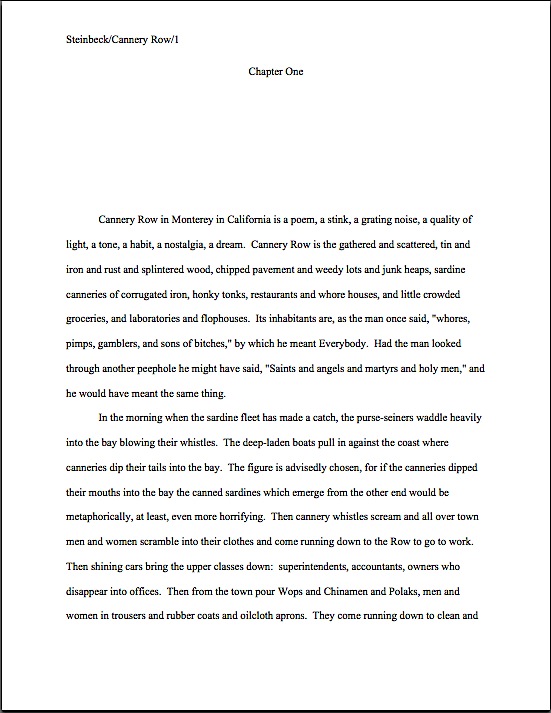
And here it is again, formatted for A4. Notice, please, how much more of the text appears on the page. My apologies for the poor image quality; my Yankee Doodle-humming computer, obviously took exception to the odd format.
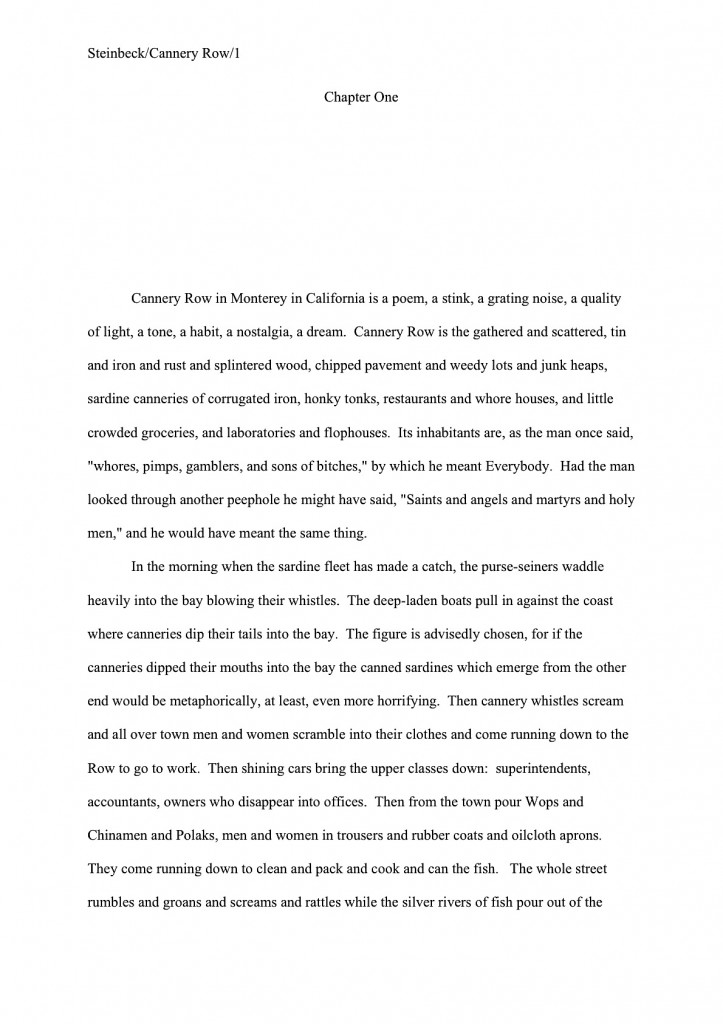
And don’t think this issue doesn’t concern you if you submit only via e-mail, either. It’s not all that unusual for agents to print out electronic submissions that have already successfully run the Millicent gauntlet. How do you think a manuscript formatted for A4 paper is going to look printed on US letter?
Oh, you thought I was going to leave that one to your fertile imaginations? No such luck.
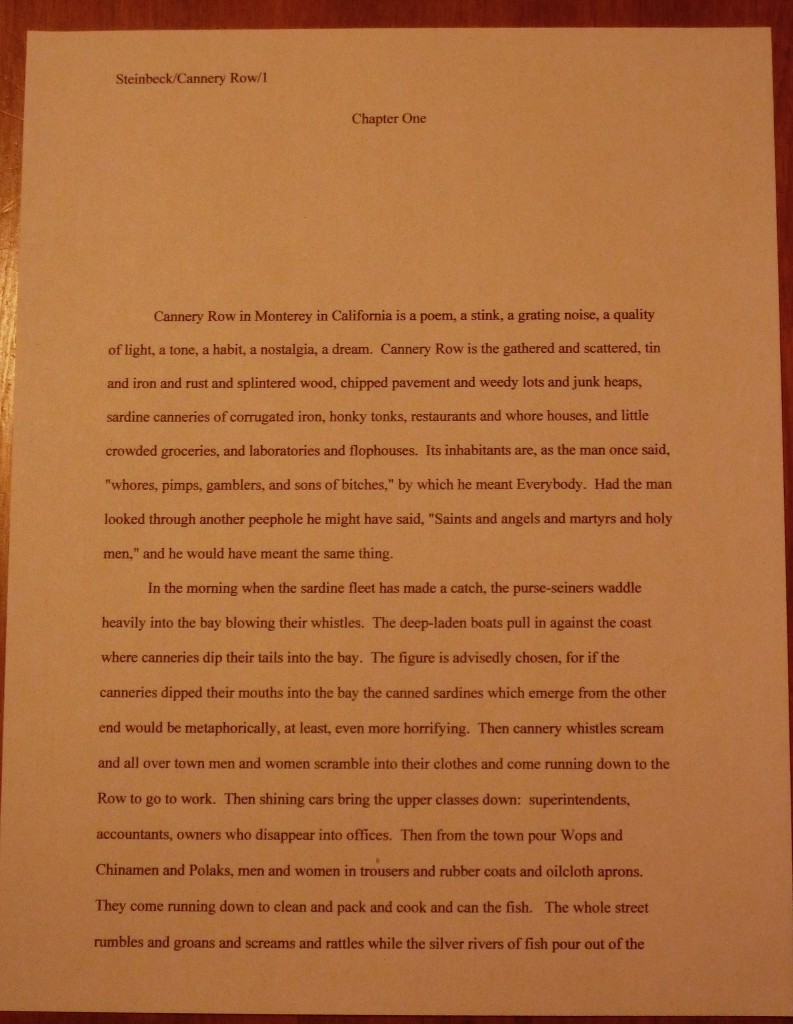
Looks like Uncle John is trying to sneak in some extra text, doesn’t it? Entirely inadvertent — just as it was when our friend P. used this format for his query. Their intentions were pure, but just try telling that to Millicent.
To be fair to her, in all probability, she’s the one who is going to have to figure out how to fix what she’s going to perceive as a printing problem. Given that she doesn’t have a whole lot of extra time in a day, how do you think she is going to feel about having to tinker with your squirrelly manuscript, P?
Remember, one of the best ways to convince an agency denizen that you’ll be a great client to handle is to require as little gratuitous time investment as possible at the querying and submission stages. Recognizing that in Rome, it might behoove one to do as the Romans do is thus pretty darn good strategy.
Now that we’ve fine-tuned P’s query so it just screams, “I may hail from Australia, but I’m hip to U.S. submission standards,” how else might we improve its chances with Millicent. Let’s take another peek at it, to refresh your memory.

Let’s start with that undoubtedly truthful, but nevertheless not particularly eye-catching opening paragraph. As we saw last time, an opening paragraph can contain every requisite element, but if it is written in a flat manner, it’s probably not going to make the best possible case for the book. That’s especially true in this case, where all of that useful information is crammed, wily-nilly, into a single sentence — and missing two necessary commas to boot. That’s like a neon sign hanging over the query, blaring I’m just trying to get through this as quickly as humanly possible.
Of course you are, P — no sane person actually likes writing queries. But trust me, reading thousands of them back-to-back is often no thrill fest, either. So why go out of your way to make that opening generic?
Yes, yes, I know: since P’s taken the trouble to seek out a similar book by one of Hawkeye’s clients, this opening actually isn’t generic. However, the purely market-based compliment — highly successful is nice, but it’s hardly high literary praise, is it? — doesn’t convey anything about why P. believes Hawkeye might be a good fit for his book.
Beyond, of course, the fact that she might be able to sell it. But since that’s an agent’s job, again, that hardly implies an admiration of her literary tastes.
The other element that makes this opening come across as a bit generic is the inclusion of the word count — and such a very round one, too. As we have discussed at length earlier in this series, the pervasive Internet rumor that every agent wants to see word count included in a query is flatly untrue; if they want it, they will ask for it in their submission guidelines. And if they do, it’s almost certainly because they like to use too-high and too-short estimates as reasons to reject queries on sight.
See why I don’t advise including it if it’s not requested? In this country, the accused have the right to eschew self-incrimination.
Hawkeye’s agency’s submission guidelines are both basic and standard (in their totality: query with SASE, far and away the most common in agency guides), so P. could easily omit this information. In fact, my sources at Picky & Pickier — oh, my spies are everywhere — tell me that would be an excellent idea for another reason: a query that claims its word count in such round terms, and precisely in the middle of the normal range, is slightly suspect. Any guesses why?
No takers? “Well, of course not, Anne,” those of you quick at doing math in your heads huff. “So P’s manuscript is precisely 360 pages — 250 words/page in Times New Roman x 360 pages = 90,000. What’s eyebrow-raising about that?”
Nothing, necessarily — provided that’s actually how P. arrived at that number. Even estimated, word counts seldom hit those big, round numbers precisely. Which might perhaps lead a jaded Millicent at the end of a long day of query-screening to wonder, fairly or not, whether the number here is accurate. Or — brace yourself; this is going to be a nasty one — if, like a surprisingly hefty percentage of first-time queriers, P. has taken the liberty of querying before he has finished writing the manuscript. 90,000 might then be his goal, not what’s already on paper.
I know, I know: I don’t think that’s what P’s doing here, either. But is including the unrequested information that the manuscript falls within standard length range for this genre really worth risking this kind of speculation? Especially when that opening paragraph could be used to make a better case for this book?
How, you ask? How about by complimenting the parallel book in terms that might also be used to review P’s novel? Or by mentioning why both books will appeal to the same audience?
Before I attempt either (or perhaps even both!) of those strategies, may I add yet another to that long list of rhetorical questions: why include the information that this is a debut novel? To Millicent, that would be self-evident from how this query is written — P. doesn’t list any previous publication history, nor does he mention previous representation. The implication, then, is that this book is a first novel.
That’s not a selling point — it’s a description. And since virtually every other query Millicent will have read this week will be for a first book, it’s a description that could be applied equally well to all of them.
Instead, why not use that valuable page space to highlight what’s legitimately unique about P’s story? How about emphasizing that genuinely remarkable authorial background?
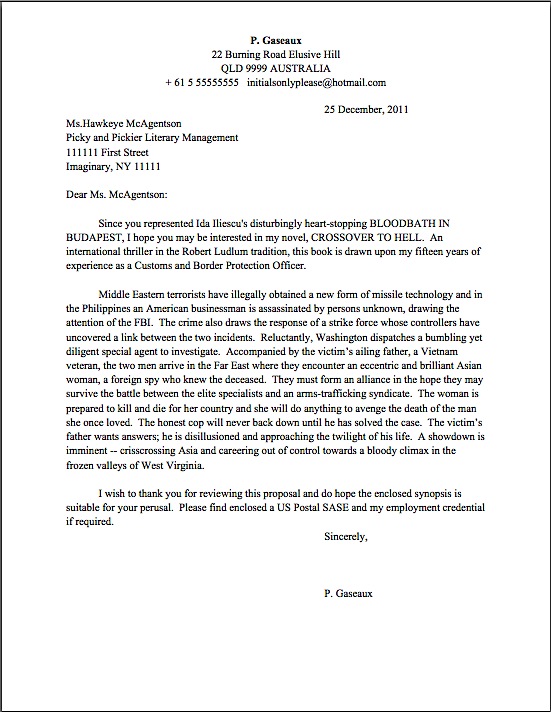
Come on, admit it: even those of you who adore writing for writing’s sake find this query more compelling now, don’t you? It certainly reads as more professional. Instead of treating that opening paragraph as a necessary bit of business, dull but unavoidable, P. now comes across as a serious writer well-versed in the conventions of his genre. Even better, he has the real-world experience to inform his protagonist’s worldview.
But wait — who is the protagonist here? The very lengthy book description paragraph leaves Millicent to guess. Yes, the original query did mention after the description who the two protagonists are — phrased as such, a tactic those of us who read for a living tend to find a bit clumsy — but as the fact that the book is the first of a pair actually isn’t relevant here, it would show off P’s storytelling abilities better simply to present the plot in the book description as the story of those two characters.
I sensed some of you doing a double-take in the middle of that last paragraph. As we have discussed at length earlier in this series, while many aspiring writers believe that using English class terms to describe their work — protagonist, antagonist, climax, etc. — will make their work sound professional, but actually, these terms are academic and review-based. The publishing industry will just want you to tell the story.
Actually, Millicent will want P. to do more in the descriptive paragraph: she will want him to show what’s thrilling about this story via the inclusion of vivid details she has not seen before. Given P’s background, that shouldn’t be a tall order at all.
I wish I could show P. how to pull that off, but the description simply has not given me enough information to revise this. At minimum, the broad generalities leave quite a few questions unanswered. Draws what response from the strike team, for instance? Why does Washington send a bumbling agent, instead of a competent one? What is the agent’s name? What is the other guy’s name, and are the two mentioned in the second part of that sentence the other guy plus our hero? Where in the Far East do they travel, and what is the name of the woman they encounter? For what country is she prepared to give her life? Is the honest cop mentioned late in the description the same person as the bumbling agent — who, if he works for the FBI, isn’t technically a cop? Or is he a policeman that was recruited by the FBI? Does the showdown careen across Asia, or do the characters?
Yes, that’s a lot to want to know from a query, but honestly, including a few telling statistics, perhaps in the space cleared by omitting character analysis like The honest cop will never back down until he has solved the case. and The victim’s father…is disillusioned and approaching the twilight of his life , would go a long way toward making this legitimately exciting story seem unique. Which, come to think of it, is another argument for showing, not telling, the character development points: generally speaking, using stock phrases is not the best means of impressing Millicent with one’s one-of-a-kind writing style.
Not having read the book, though, I can’t answer any of these questions; I leave that to P’s no doubt talented revision pen. However, just breaking up that huge descriptive paragraph will help make the story come across as even more exciting. Take a gander:
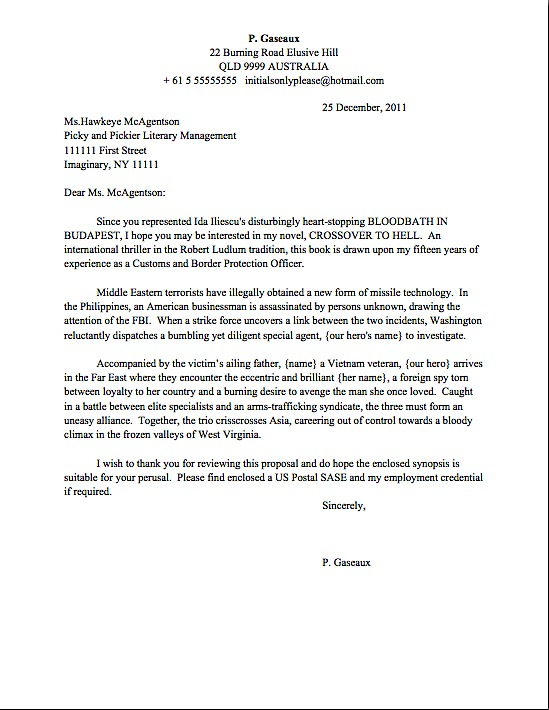
Stronger now, isn’t it? Still, as a reader, I long to see more of the story. Fortunately, editing out the summary statements about character development has freed up quite a bit of page space for adding vivid details. Have at it, P!
Did you notice, though, that in my haste to rework this query, I messed up some of the spacing? Symmetry, my dears, symmetry: since there’s a skipped line between the salutation and the body of the letter, there should be a skipped line between the final paragraph and sincerely.
Before I correct that, though, were those of you reading this under the flag of Francis Scott Key — a forebear of F. Scott Fitzgerald’s, by the way; that’s what the F. stands for — struck by anything in that otherwise quite charmingly polite final paragraph? Like, say, that some of the probably perfectly-reasonable-in-Australia statements it contains don’t really make sense stateside?
Something’s getting lost in translation here, clearly. Let’s all chip in to bridge the trans-Pacific divide. To aid in that effort, take a gander at that paragraph up close and personal:
I wish to thank you for reviewing this proposal and do hope the enclosed synopsis is suitable for your perusal. Please find enclosed a US Postal SASE and my employment credential if required.
First, let’s start with the terminology. In U.S. publishing circles, a query is not a proposal — in fact, a proposal is something quite different. It’s the collection of marketing materials, competitive market analysis, and sample chapter(s) that nonfiction writers put together to sell their books to publishers.
Also, by definition, a SASE in this country carries U.S. postage. And what, may I ask, is an employment credential, and why would it be beneficial to provide at the submission stage?
Which I suppose is another way of saying: no, it’s not required, P. — and please don’t send it. Believe me, Millicent won’t know what to do with it, and frankly, it’s radically premature. When your agent sells your manuscript and needs to process payments for you, she will tell you what information she needs.
There’s also something a trifle odd — to American literary eyes, at least — about the phrase I…do hope the enclosed synopsis is suitable for your perusal. First, it raises a question that it honestly isn’t in P’s interest for Millicent to ponder: is the enclosed synopsis suitable to be read, or is there something about it that may prompt her to reject it unread? Second — and this impression is abetted by the use of the word review earlier in the sentence to talk about something a screener is likely to read only once — the phrasing draws attention to the repeated use of the word enclosed. Since Millicent, like all professional readers, finds word and phrase repetition eye-distracting, this wording would tend to cause her to focus on what is in fact a standard polite closing, rather than the story being offered.
Third, I suspect this isn’t what P. actually means here: he probably hopes that she finds the synopsis acceptable — or, better yet, enjoyable. I’m guessing, too, that he wants to find a graceful way to bring up the fact that she’ll find a synopsis tucked into the envelope.
So why not say both directly? And while we’re at it, why not include some information that she’ll find useful if she wants to see his manuscript: the fact that contacting him by e-mail would be far faster than stuffing a let’s-see-pages missive into the SASE.
Here’s that query again, streamlined so as to render that ending quick, clean, and businesslike. That way, Millie’s attention can remain where it best serves the book’s interests: squarely upon the plot and P’s excellent background for writing this story.
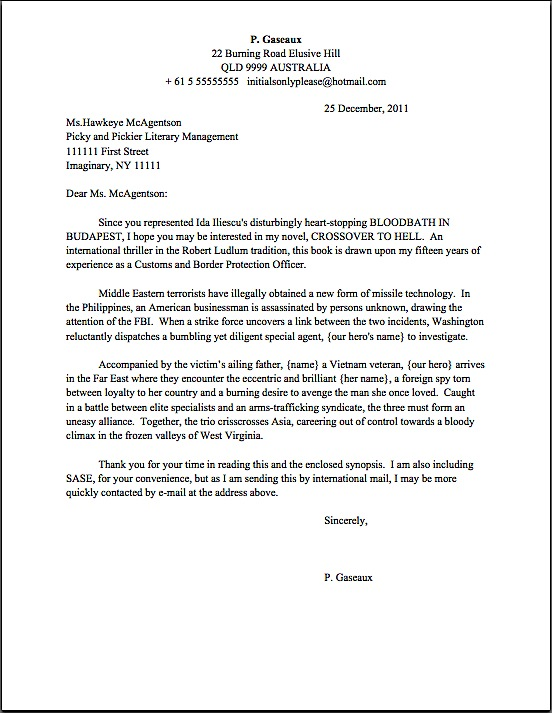
One last nit-pick, then we’ll send P. on his merry way. I get that he would prefer to have an initial, rather than a first name, grace the cover of his books. It’s not a bad choice, either: it would indeed look rather good in print.
I have a practical concern, however: should Hawkeye the agent want to pick up the phone and call this exciting new author, to whom would she ask to speak? You must admit, even the bravest among us might harbor a few trepidations about calling a complete stranger and quavering, “Hello. May I speak to P., please?”
Oh, you may laugh, but queriers place poor Hawkeye and her cronies in this uncomfortable position all the time. It makes sense from an authorial perspective, of course: if one has decided a pen name is preferable to one’s own, one is naturally anxious to start using it. But as anyone who has written professionally under a pseudonym, like yours truly, could tell you behind closed doors, one’s identity remains a secret only from the reading public; the agent handling the writer knows her real name. So does her publisher.
There’s a very, very good reason for that: a writer doesn’t sign representation or publication contracts under her pen name; she signs with her real name. And wouldn’t all of us prefer to have advance and royalty checks made out to us in the name by which our banks know us?
(Never you mind what I’ve written under my noms de plume — yes, I’ve used several. Not at all uncommon for authors who write in more than one genre, or both fiction and nonfiction. But don’t shatter the illusions of the aforementioned reading public, please; let it be our little secret.)
So if I were toddling around in your shoes, P., I would go ahead and query with a full first name — and your real one. Neither of which, naturally, I am going to divulge here.
Hey, the pseudonymous need to stick together. We and Anonymous are going out for coffee later.
Join me, please, in offering profound thanks to P. for helping bring the special challenges of the far-flung querier to our attention — and please, international readers, chime in with the difficulties you have faced in querying and submitting to US-based agencies. As we have seen, sometimes chatting with a native can help iron out any lingering translation problems.
Keep up the good work!








